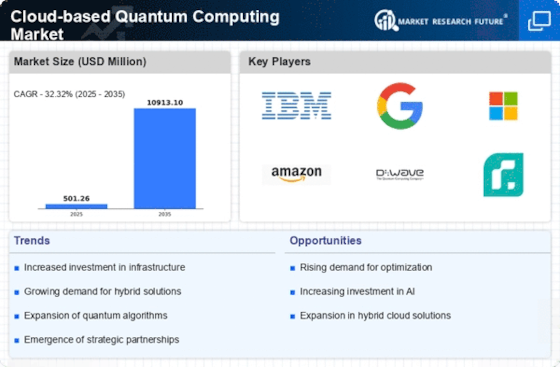Top Industry Leaders in the Cloud based Quantum Computing Market

Competitive Landscape of Cloud-based Quantum Computing Market: A Deep Dive
The cloud-based quantum computing market is still in its nascent stages, yet it holds immense potential for revolutionizing diverse industries. As accessibility and capabilities of quantum computers increase through cloud platforms, the competition in this space is heating up, with various established and emerging players jostling for market share.
Key Players:
-
IBM
-
Microsoft
-
Google
-
AWS (Amazon Web Services)
-
Baidu
-
Rigetti Computing
-
D-Wave Quantum Inc.
-
T-Systems International GmbH
-
Huawei Technologies Co.
-
Accenture
-
Cambridge Quantum Computing
-
Fujitsu
-
1QBIT
-
Riverlane
-
D-Wave Systems
-
Zapata Computing
-
Honeywell
-
QC Ware
Market Share Analysis:
-
Technology Leadership: Quantum hardware capabilities, qubit count, error correction techniques, and software development tools are crucial factors for market share. Companies like IBM and Google with advanced hardware and open-source software platforms are well-positioned.
-
Industry Focus: Players targeting specific industries with tailored solutions and partnerships hold an advantage. Rigetti's focus on financial modeling and Xanadu's expertise in materials science are prime examples.
-
Pricing Strategies: The high cost of quantum computing necessitates flexible pricing models like pay-per-use and subscription packages. Offering competitive pricing and diverse options can attract cost-conscious users.
-
Geographical Reach: Global expansion and local partnerships are key to capturing broader market share. Companies like AWS with its extensive cloud infrastructure and regional data centers have an edge.
New and Emerging Companies:
-
Hardware Focus: Start-ups like Quantum Brilliance and ColdQuanta are developing novel hardware architectures beyond superconductors, potentially offering greater scalability and efficiency.
-
Software Solutions: Several companies are providing software tools and algorithms specifically designed for cloud-based quantum computing, like QuTech and Cambridge Quantum Computing, lowering the barrier to entry for users.
-
Hybrid Computing Companies: Players like QuTech Delft and QCI are bridging the gap between classical and quantum computing, offering hybrid solutions that leverage the strengths of both architectures.
Current Investment Trends:
-
Venture Capital: VC firms are pouring billions into quantum computing startups, with companies like Rigetti, IonQ, and Xanadu securing significant funding rounds. -
Government Funding: Governments worldwide are recognizing the potential of quantum computing and investing in research and development initiatives. -
Corporate Investments: Major corporations, particularly in pharmaceuticals, finance, and materials science, are investing in internal quantum computing capabilities or partnering with established players.
Latest Company Updates:
August 2023- China Mobile launched China's biggest quantum cloud computing system together with China Electronics Technology Group Corp (CETGC). They aim to bring quantum computing to a new level of practical application. The system was revealed at the 2023 China Computational Conference in Yinchuan, located in Northwest China's Ningxia Hui Autonomous Region. Leveraging CETGC's ability to independently design and construct 20-qubit quantum processing chips, the system connects to state-of-the-art 20-qubit quantum computers. This provides users an open quantum fusion computing power testing environment. The new quantum cloud computing platform can assist researchers and companies in conducting quantum algorithm experiments. It also makes access available to universities and other institutions.
April 2023- SEEQC, the digital quantum computing company, revealed and showcased the first complete quantum computer in Italy at its lab in Naples. The creation of the quantum computer, called SEEQC System Red, represents a significant technological and innovation achievement for the nation and the sector. SEEQC Red also provides the quickest native two-qubit gates on public quantum cloud services, attaining gate speeds up to 10 times quicker than rivals, while providing gate fidelities comparable to the most advanced systems on quantum cloud platforms currently available.
March 2023- Domestic information technology (IT) company HCL Technologies announced lately that it has partnered with Microsoft's quantum cloud computing service Azure Quantum. As part of this partnership, HCLTech will provide cloud-based quantum computing services to its customers by leveraging Microsoft's Azure Quantum platform as the technology infrastructure. The services will be delivered through HCLTech's Q-Labs, which has been one of the partners providing Azure Quantum credits on behalf of Microsoft. Through this collaboration with Microsoft, HCLTech aims to make quantum computing capabilities accessible to enterprises by offering these advanced services via the cloud.










